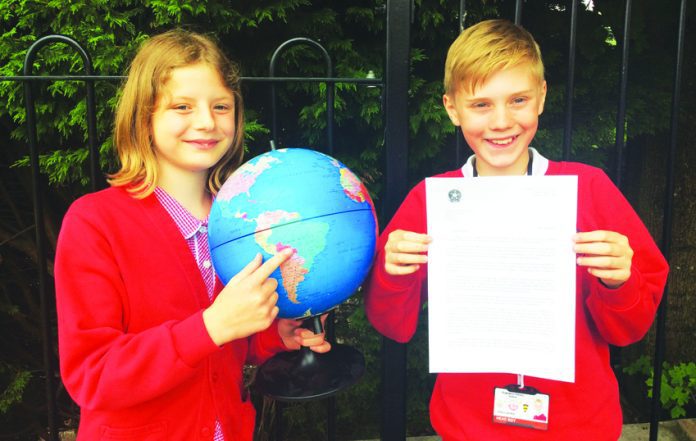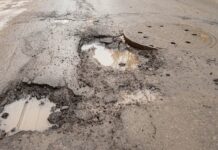
Pupils from Buglawton Primary School in Congleton were recently “delighted” to receive a letter from the Embassy of Brazil in London, in response to pupils’ letters of concern over the future of Brazil’s rainforests.
The pupils had been studying Brazil as part of their year six geography topic and had wanted to learn more about the Amazon rainforest after reading The Explorer by Katherine Rundell.
“The text involved a plane crash in the rainforest and children exploring through it to safety. This really gripped our pupils who wanted to learn more about it,” said Helen Kennedy, year six teacher.
After further research into the deforestation of rainforests and the consequences for tribes living within them and the earth as a whole, pupils gathered facts and statistics before writing letters to the Brazilian Embassy calling for action.
Pupils used examples such as the effects on wildlife, the world’s medicine, and the significant contribution of oxygen that the rainforest provides.
The Brazilian Embassy responded to the letters with an invitation for pupils to join in workshops held at the embassy in London to learn more about Brazil’s actions for sustainable development.
The Guardian last year reported that satellite imagery gathered by Brazil’s space agency Inpe suggested that efforts to protect the rainforest were failing, and in August it detected more than 7,600 fires in Amazonas – one of nine states making up the Brazilian Amazon – the highest number since 1998 and nearly 1,000 more than in 2019. Inpe said that across the entire Amazon region it had detected more than 29,307 fires in August 2020 – the second highest number in a decade.
“The Amazon is condemned to destruction,” one former top official at Brazil’s environmental agency, told the Guardian, accusing the far-right populist president Jair Bolsonaro of overseeing a wholesale “demolition” of protection efforts.
“Under this government there will be no combating (of rainforest destruction),” the ex-official said. “The future looks dark.”
The majority of the fires in the Amazon are intentional, the result of illegal deforestation and clearing of farmland. Wildfires are quite rare in tropical rainforests, due to their high humidity.
However, in the letter to Buglawton, the Brazilian Embassy said its government “shares the concerns expressed by your pupils regarding the need to protect the world’s forests” and hit back at claims that Brazil was destroying rainforests.
Tropical rainforests cover less than 7% of the Earth’s dry land surface but half of all plant and animal species in the world call rainforests home, and rainforests generate about 20% of the world’s oxygen. Virgin forest also potentially contains animals carrying novel diseases such as covid-19, and destroying forests exposes mankind to the risk of new infections.
The embassy said that according to the Food and Agriculture Organisation of the United Nations, Brazil boasted the second largest area of primary forests (virgin or old-growth) in the world – more than 493m hectares.
Said the letter, written by João Marcos Paes Leme, deputy head of mission: “More than 60% of our territory and more than 80% of the Amazon biome are covered with native vegetation. To put things into perspective, according to the Woodland Trust, the United Kingdom has only 2.5% of its territory covered by ancient woodland.
“Only 30% of the Brazilian territory is dedicated to farming (agriculture and livestock), while European countries usually range between 45% and 65% – and, in the UK, this figure is 74%.
“Even though such a small percentage of our land is used for agricultural production, Brazil is the second largest agricultural exporter and feeds around 20% of the world population.”
Said Mr Leme: “We have shown that it is possible to increase food production and reduce deforestation at the same time. Annual deforestation rates in the Amazon have decreased 72% between 2004-2018, while our grain production increased more than 60% during the same period.”
Mr Leme added: “We acknowledge that deforestation increased in recent years, and we are looking into it to resume the reduction trend of the past 15 years.
“Rest assured that the Brazilian government has been acting strongly to prevent the systematic destruction of forests that unfortunately took place in other continents.
“To monitor and control deforestation, Brazil relies upon an efficient combination of cutting-edge satellite systems that provide information to enforcement authorities distributed strategically close to the so-called illegal ‘deforestation hotspots’. As an additional layer of oversight, the ministry of the environment has recently procured a new system of high-resolution satellite images to be collected on a daily basis.”
In May, Reuters reported that deforestation in Brazil’s Amazon rainforest rose 43% in April from the same month in 2020, preliminary government data showed, the second consecutive monthly rise ahead of the annual burning season.
In the first four months of 2021, deforestation in the Brazilian Amazon totalled 1,157 square kilometres, although this was down 4% from a year earlier, according to Inpe.
Illegal logging and forest fires have soared since Mr Bolsonaro took office in 2019, with deforestation hitting a 12-year high in 2020, the Brazilian government’s own data showed.
The number of deaths related to covid-19 has surpassed 500,000 in Brazil, the second-highest in the world, in June. The virus was spreading as President Bolsonaro refused to back measures such as social distancing. Only the US has reported more total deaths related to covid-19.




